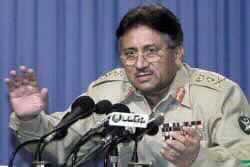Pakistani opposition parties, Islamic groups and legal bodies on Thursday angrily rejected constitutional changes by military ruler General Pervez Musharraf that will help him wield overall power after October polls. Analysts say the controversial amendments could lead to a power struggle between Musharraf and the parliament formed after the October 10 polls, if the opposition can make a strong enough showing in the vote.
Musharraf, who seized power in a bloodless coup in 1999, unveiled the amendments on Wednesday, empowering him to dismiss an elected parliament, name heads of military services and chair a civilian-military National Security Council to oversee the government formed after the October 10 election.
"The question is not whether the parliament can undo these amendments in the short term," said Najam Sethi, editor of independent Daily Times newspaper.
If that happened, he said, "there will be enough tension between the parliament and the president to make the system extremely unstable."
Hamid Khan, president of Supreme Court Bar Association, the country's main lawyers' body, said the sweeping changes could unleash a new constitutional crisis.
"These changes make president and armed forces more powerful than the elected representatives of the people," he told Reuters.
The Pakistan People's Party of exiled former prime minister Benazir Bhutto called the National Security Council "a device to re-write the civil-military equation on military terms, which no civil society can accept."
Hardline Islamic groups, traditional allies of military dictators who have ruled Pakistan for more than half its 55-year history, called the move "unconstitutional and undemocratic."
"He has darkened the future of democracy in Pakistan," said Liaquat Baluch, deputy head of Jamaat-e-Islami, the major hard-line Islamic group.
The attitude of such hard-liners toward Musharraf soured after he threw his weight behind the U.S.-led war on terror that toppled the fundamentalist Taliban regime in Afghanistan .
The religious parties, whose strength in the past has been more in noisy street protests than in popular votes, have recently been discussing the possibility of cooperating with the opposition for the election.
Samina Ahmed, a Pakistan expert from the International Crisis Group, said the fate of Musharraf's amendments lay in the hands of the parties returned to parliament in October.
"If the political parties accept them in the parliament, then...they become the law of the land. If they don't accept them, then there is going to be tension between Musharraf and the political leadership.," she said.
The major opposition parties are giving indications they plan to forge a loose coalition for the polls.
The two largest parties -- Bhutto's PPP and the Pakistan Muslim League of another exiled former prime minister, Nawaz Sharif -- last week agreed to cooperate.
PHOTO CAPTION
Pakistan President General Pervez Musharraf holds a news conference in Islamabad, August 21, 2002. Pakistani opposition parties, Islamic groups and legal bodies angrily rejected constitutional changes by Musharraf that will help him wield overall power after October polls. (Mian Khursheed/Reuters
- Author:
& News Agencies - Section:
WORLD HEADLINES


 Home
Home Discover Islam
Discover Islam Quran Recitations
Quran Recitations Lectures
Lectures
 Fatwa
Fatwa Articles
Articles Fiqh
Fiqh E-Books
E-Books Boys & Girls
Boys & Girls  Ramadan
Ramadan Fatwa Audios
Fatwa Audios Month of Mercy
Month of Mercy Women
Women Eed Al- Fitr
Eed Al- Fitr Food Recipes
Food Recipes Videos
Videos

 Prayer Times
Prayer Times












